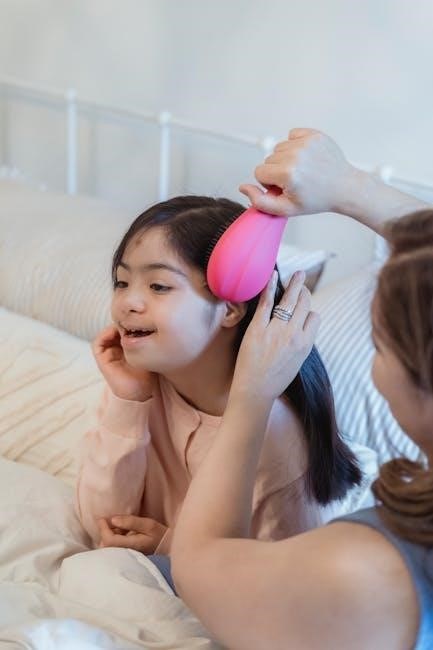Tennessee’s child care rules ensure safe, healthy, and educational environments for children. These regulations apply to family homes, group homes, centers, and drop-in facilities, outlining licensing, safety, and operational standards to protect children and guide providers. The state enforces strict guidelines to maintain quality care, with detailed requirements available in official PDF resources.
Overview of Child Care Licensing in Tennessee
In Tennessee, child care licensing ensures providers meet safety, health, and educational standards. The Department of Human Services regulates facilities, including family child care homes, group homes, centers, and drop-in programs. Licensing requires compliance with specific rules, such as staff qualifications, child-to-staff ratios, and physical environment safety. A Temporary Certificate of Approval allows new programs to operate while achieving full compliance. Regular inspections are conducted to enforce adherence to these standards, ensuring quality care for children. Detailed licensing requirements are outlined in official resources like the Tennessee Child Care Rules and Regulations PDF.
Purpose of Child Care Regulations
The purpose of Tennessee’s child care regulations is to protect children by ensuring safe, healthy, and educationally enriching environments. These rules establish minimum standards for care, guiding providers to maintain high-quality services. They also help parents make informed decisions by setting clear expectations for safety, staffing, and facility conditions. By enforcing these standards, the state aims to promote the well-being and development of children while giving families confidence in the care their children receive. Regular compliance checks ensure these goals are met, fostering trust and accountability in the child care system.

Types of Child Care Facilities in Tennessee
Tennessee recognizes family child care homes, group child care homes, child care centers, and drop-in child care centers, each offering distinct care settings and operational structures.
Family Child Care Homes
Family child care homes provide care in a residential setting, offering a home-like environment for children. These homes are licensed and must meet specific safety and health standards. Caregivers are required to undergo background checks and complete training. The maximum number of children allowed is determined by state regulations, ensuring personalized attention. Homes must pass regular inspections to maintain licensing. These settings are ideal for families seeking a smaller, more intimate care environment, with caregivers often providing flexible schedules and a nurturing atmosphere tailored to individual child needs.
Group Child Care Homes
Group child care homes provide care for larger numbers of children compared to family homes, typically serving more than six children. These homes must meet specific licensing requirements, including staff qualifications and training. The maximum number of children allowed is determined by state regulations, ensuring adequate supervision. Homes are inspected regularly to maintain compliance with health, safety, and educational standards. Group child care homes offer a structured environment with activities designed for children’s developmental needs. Caregivers must undergo background checks, and the home must meet fire and safety codes to ensure a secure setting for children.
Child Care Centers
Child care centers in Tennessee are licensed facilities providing care for larger groups of children. These centers must meet strict health, safety, and educational standards. Licensing requires staff to undergo background checks and training. Centers are subject to regular inspections by the Department of Human Services to ensure compliance. They must maintain proper staff-to-child ratios and group sizes. Safety measures include emergency preparedness plans and proper supervision. Centers are required to provide a structured environment with age-appropriate activities. The state ensures these facilities offer safe, healthy, and educationally enriching environments for children, with ongoing monitoring to uphold quality care standards.
Drop-In Child Care Centers
Drop-in child care centers in Tennessee provide temporary care for children, offering flexibility for parents. These centers must comply with state regulations, including operational hour limits and capacity restrictions. They are required to obtain parental authorization and maintain proper supervision at all times. Safety protocols are essential, with staff trained in emergency procedures. Drop-in centers are not permitted to provide overnight care, and they must adhere to health and hygiene standards. These facilities offer a convenient option for short-term care while ensuring the well-being and safety of children through adherence to Tennessee’s licensing and regulatory requirements. Regular inspections ensure compliance with these standards.

Licensing Requirements for Child Care Providers
Tennessee requires child care providers to meet strict licensing standards, ensuring safe environments through background checks, staff qualifications, and compliance with health, safety, and educational regulations.
Application Process for Child Care Licenses
The application process for child care licenses in Tennessee involves submitting detailed forms and meeting specific requirements. Providers must complete an application, pay fees, and undergo inspections. The Department of Human Services reviews applications to ensure compliance with health, safety, and educational standards. Required documents include criminal background checks, health inspections, and staff qualifications. Once approved, a provisional license is issued, followed by a permanent license after demonstrating compliance. The process ensures that providers meet state regulations, safeguarding children’s well-being and educational growth.
Background Checks and Staff Qualifications
Tennessee requires comprehensive background checks for all child care staff, including fingerprinting and criminal history reviews. Providers must ensure staff meet educational and training standards, with directors holding specific certifications. Ongoing professional development is mandated to maintain licensure. These measures ensure a safe and qualified workforce, aligning with state regulations to protect children and provide high-quality care.
Health and Safety Standards
Tennessee’s health and safety standards for child care ensure a clean, sanitary, and hazard-free environment. Facilities must maintain proper ventilation, hygiene practices, and emergency preparedness plans. Staff are required to administer first aid and CPR, with training in preventing the spread of illnesses. Regular health inspections and adherence to immunization policies are mandated. Safety measures include secure storage of toxic substances, proper food handling, and emergency exit drills. These standards aim to protect children from harm and promote a healthy environment for growth and development, aligning with state regulations and best practices in child care.
Minimum Requirements for Child Care Centers
Child care centers in Tennessee must meet specific minimum requirements to ensure quality care. These include adequate staff-to-child ratios, proper group sizes, and a safe physical environment. Centers must maintain general liability insurance and adhere to health and safety protocols. They are required to have an adequate budget, operational plans, and proper record-keeping. The state mandates regular inspections to ensure compliance with these standards, which are designed to provide a safe and educationally rich environment for children. These requirements are outlined in official PDF resources and are essential for obtaining and maintaining a license.

Specific Requirements for Child Care Centers
Child care centers must meet specific safety, health, and educational standards. They require adequate budgets, insurance coverage, and staff-to-child ratios. Centers must also provide scheduled activities, ensuring a safe and enriching environment for children.
Staff-to-Child Ratios
Tennessee mandates specific staff-to-child ratios to ensure proper supervision and care. For infants, the ratio is 1:4, while toddlers require 1:5. Preschoolers need 1:8, and school-age children require 1:12; These ratios ensure safety, individual attention, and developmental support. Facilities must maintain these ratios during all activities, including outdoor play and field trips. Compliance with these standards is crucial for licensing and maintaining a safe environment. Providers must adhere strictly to these guidelines to meet state regulations and promote quality care.
Group Size Limits
Tennessee imposes group size limits to ensure quality care and safety. Infant groups may not exceed 8 children, toddlers 10, preschoolers 16, and school-age children 20. These limits ensure proper supervision, individual attention, and a safe environment. Providers must maintain these standards during all activities, including outdoor play. Larger groups risk losing licensing approval. Compliance with group size limits is essential for maintaining a high standard of care and meeting state regulations.
Physical Environment and Safety Measures
Tennessee requires child care centers to maintain a safe and healthy physical environment. Facilities must meet building codes, with adequate lighting, ventilation, and temperature control. Emergency exits, smoke detectors, and fire extinguishers are mandatory; Storage of hazardous materials must be secure, and playgrounds must be safe with proper fencing. First aid kits and emergency plans are required. Regular inspections by the Department of Human Services ensure compliance with these standards to protect children from potential hazards and ensure a secure environment for learning and play.
Health Protocols and Hygiene Practices
Tennessee mandates strict health protocols to prevent the spread of illness in child care settings. Staff must follow proper handwashing techniques, and sanitize surfaces regularly. Children must have access to handwashing stations, and tissues should be available for coughing or sneezing. Policies for managing sick children include isolation areas and notification procedures for parents. Immunization records must be maintained for all children. These practices are designed to create a clean and healthy environment, reducing the risk of disease transmission and ensuring the well-being of all children in care.

Regulations for Family Child Care Homes
Family child care homes in Tennessee must meet specific safety and health standards, including maximum child capacity, regular home inspections, and maintained records for compliance.
Maximum Number of Children Allowed
Licensed family child care homes in Tennessee may care for up to six children, including the provider’s own children. Regulations specify age-specific ratios, such as no more than two infants or three toddlers, to ensure safety and quality care. These limits help maintain a nurturing environment, allowing providers to meet individual needs effectively while adhering to state guidelines.
Home Safety Inspections
Home safety inspections for family child care homes in Tennessee are mandatory to ensure compliance with health and safety standards. Inspections are conducted by the Department of Human Services (DHS) to verify adherence to fire safety, sanitation, and physical environment requirements. Providers must maintain working smoke detectors, first aid kits, and secure storage for hazardous materials. Inspections also check for proper emergency exits and child-proofing measures. Any violations must be corrected to avoid penalties or license denial, ensuring a safe environment for children in care.
Record-Keeping and Reporting Requirements
Tennessee requires family child care homes to maintain accurate records, including attendance logs, health information, and emergency contact details for each child. Providers must also document staff qualifications and training. Incident reports for injuries, illnesses, or allegations of abuse must be filed within 24 hours. Records must be retained for at least three years and made available during inspections. Regular reporting to the Department of Human Services (DHS) ensures compliance with licensing standards. Failure to maintain proper records may result in penalties or license revocation, emphasizing the importance of thorough documentation.

Standards for Group Child Care Homes
Tennessee requires group child care homes to meet specific safety, staffing, and activity standards, ensuring a structured environment with qualified caregivers and age-appropriate activities for children.
Staff Training and Certification
In Tennessee, staff in group child care homes must complete training in child development, health, and safety. Directors require additional certification in program administration. All caregivers must undergo background checks and maintain certifications in CPR and first aid. Training topics include child abuse prevention, nutrition, and emergency preparedness. Staff must also participate in ongoing professional development to stay updated on best practices. Certification renewal is required every two years, ensuring continuous quality improvement. These requirements aim to equip caregivers with the skills needed to provide safe, nurturing, and developmentally appropriate care for children.
Child Supervision and Activity Planning
Tennessee requires group child care homes to maintain adequate staff-to-child ratios to ensure constant supervision. Activities must be age-appropriate, promoting physical, emotional, and cognitive development. Daily schedules should balance structured activities with free play, including outdoor time weather-permitting. Supervision must be direct and continuous, with specific safety measures during transitions and outdoor play. Activities should foster social interaction, creativity, and learning. Providers must also maintain records of planned activities and ensure they align with the developmental needs of the children in their care, reflecting a focus on holistic child development and well-being.
Emergency Preparedness Plans
Tennessee requires child care facilities to develop and implement comprehensive emergency preparedness plans. These plans must include evacuation procedures, communication strategies for parents, and first aid protocols. Facilities must conduct regular evacuation drills, ensuring all children and staff are prepared for emergencies like fires or natural disasters. Emergency contact information must be readily accessible, and staff must receive training on implementing the plan. The plan should also address shelter-in-place scenarios and provide clear instructions for handling medical emergencies. Regular updates and drills ensure readiness, safeguarding children and staff during critical situations.

Drop-In Child Care Centers
Drop-in centers provide short-term care for children, with specific rules on operational hours, capacity, and staff qualifications. These centers must meet health and safety standards, ensuring a secure environment for temporary care.
Operational Hours and Capacity
Drop-in child care centers in Tennessee must operate within specified hours and adhere to capacity limits. Centers are required to maintain a maximum child-to-staff ratio and ensure adequate space per child. Operational hours must be clearly posted, and centers may not exceed their licensed capacity. Health and safety protocols, including proper supervision, must be maintained during all hours of operation. Additionally, centers must notify parents of any changes in operational hours or capacity constraints. These regulations ensure a safe and organized environment for temporary care, aligning with Tennessee’s child care licensing standards.
Parental Authorization and Release Forms
Tennessee requires drop-in child care centers to obtain parental authorization and release forms before providing care. These forms must include emergency contact information, medical consent, and permission for activities. Parents must sign releases allowing providers to seek medical attention if needed. Centers must maintain these records securely, ensuring compliance with privacy laws. Authorization forms are mandatory for enrollment and must be updated annually or when circumstances change. This ensures providers can act in the best interest of the child during care. The state mandates strict adherence to these requirements to protect both children and providers. Proper documentation is essential for legal and safety purposes.
Supervision and Safety Protocols
Tennessee requires strict supervision and safety protocols in drop-in child care centers to ensure children’s well-being. Staff must maintain visual supervision of children at all times, including during outdoor play and transitions. Safety measures include secure entry and exit procedures, first aid availability, and emergency evacuation plans. Providers must conduct regular safety inspections of the facility and equipment. Supervision ratios are enforced to prevent accidents and ensure prompt response to incidents. These protocols aim to create a secure environment, protecting children from harm while in care. Compliance with these standards is mandatory for licensing and operation.

Child Development and Educational Standards
Tennessee’s standards promote age-appropriate activities, curriculum alignment with developmental milestones, and use of assessment tools to support children’s growth and readiness for school. These standards ensure inclusive environments that foster cognitive, social, emotional, and physical development, while also addressing the needs of children with special requirements. The goal is to provide a foundation for lifelong learning through structured, engaging, and nurturing educational experiences. Compliance with these standards is essential for licensed child care providers.
Age-Appropriate Activities and Curriculum
Tennessee requires child care providers to implement age-appropriate activities and curricula aligned with developmental milestones. These activities must foster cognitive, social, emotional, and physical growth, ensuring children are well-prepared for school. The curriculum should be tailored to the unique needs of each age group, from infants to school-age children, and must be documented to reflect individual progress. Structured play, educational content, and hands-on experiences are essential components. Providers are also expected to maintain records of these activities to ensure compliance with state standards and support the continuous development of each child in their care.
Screening and Assessment Tools
Tennessee child care regulations require the use of approved screening and assessment tools to evaluate children’s developmental progress; These tools help identify cognitive, social, emotional, and physical milestones, ensuring timely interventions for children with special needs. Providers must use standardized assessments to guide curriculum planning and individualized care. Screening results are confidential and shared with parents, who must consent to further evaluations. This process ensures children receive appropriate support and resources, aligning with state educational standards and promoting overall development. Regular assessments also help track progress and adjust care strategies to meet each child’s unique needs effectively.
Support for Children with Special Needs
Tennessee child care regulations mandate support for children with special needs, ensuring inclusive and accessible care. Providers must make reasonable accommodations to meet individual requirements, such as physical adaptations or specialized equipment. Staff are required to receive training on caring for children with special needs, including understanding IEPs or IFSPs. Programs must collaborate with parents and specialists to develop tailored care plans. Confidentiality and dignity are prioritized, with a focus on promoting social integration and developmental opportunities; These measures ensure children with special needs receive equitable and supportive care, aligned with state licensing standards and best practices.

Enforcement of Child Care Regulations
Tennessee enforces child care regulations through regular inspections and compliance checks. Facilities violating rules face penalties, including fines or license revocation, ensuring adherence to state standards.
Inspections and Compliance Checks
Tennessee conducts regular inspections and compliance checks to ensure child care facilities meet state regulations. These inspections evaluate staff-to-child ratios, safety measures, health protocols, and educational activities. Facilities are inspected annually, with additional unannounced visits possible. Non-compliance results in corrective action plans, fines, or license suspension. Providers must address deficiencies promptly to maintain operations. Inspections ensure a safe and nurturing environment for children, aligning with state standards for quality care. Compliance checks also verify proper record-keeping and emergency preparedness, supporting the well-being of children in care.
Consequences of Non-Compliance
Non-compliance with Tennessee child care regulations can result in fines, license suspension, or revocation. Facilities failing to meet standards may face corrective action plans or temporary closure. Repeated violations can lead to loss of certification, impacting a provider’s ability to operate. Severe non-compliance, such as endangering children, may result in immediate shutdown. Providers are required to address deficiencies promptly to avoid penalties; Non-compliance also affects a facility’s public rating and parental trust. The state prioritizes accountability to ensure high-quality, safe care for children, with enforcement measures designed to protect their well-being and uphold regulatory standards.
Appeals Process for License Denials or Revocations
Child care providers in Tennessee have the right to appeal license denials or revocations. The appeals process involves submitting a written request to the Department of Human Services within a specified timeframe. The Child Care Agency Board of Review reviews the case, ensuring fairness and adherence to regulations. Providers may continue operating during the appeal unless immediate closure is deemed necessary for safety. The board’s decision is final, but providers can seek further legal recourse if needed. This process ensures accountability while protecting the rights of child care operators, maintaining a balance between regulatory enforcement and due process.

Resources for Parents and Caregivers
Tennessee provides resources to help parents choose licensed child care. The Department of Human Services offers reports, ratings, and guidance to ensure informed decisions and access to assistance programs.
How to Choose a Licensed Child Care Provider
Selecting a licensed child care provider in Tennessee involves checking their compliance with state regulations. Parents should review the provider’s licensing status, health and safety standards, staff qualifications, and child-to-staff ratios. Visit the Tennessee Department of Human Services website for reports and ratings. Ensure the facility meets physical environment and safety measures, such as adequate space and emergency preparedness plans. Additionally, verify the provider’s history through compliance checks and reviews. Open communication with staff and observing daily activities can also provide insights into the quality of care offered. Prioritize providers who adhere to educational and developmental standards, ensuring a nurturing environment for your child.
Understanding Child Care Ratings and Reports
Understanding child care ratings and reports is crucial for evaluating the quality of care. In Tennessee, licensed providers are rated based on compliance with state regulations, health standards, and educational practices. Reports are generated by the Department of Human Services and include details on inspections, violations, and corrective actions. Parents can access these reports online to assess a provider’s adherence to safety protocols, staff qualifications, and child-to-staff ratios. Ratings often include a scale or grading system, helping families make informed decisions about their child’s care. These resources ensure transparency and accountability, empowering parents to choose reliable and high-quality child care services.
Accessing Child Care Assistance Programs
Tennessee offers child care assistance programs to help eligible families afford quality care. The Department of Human Services administers these programs, providing subsidies to low-income families. Eligibility is based on income, family size, and other criteria. Parents can apply online or through local offices. Additionally, special support is available for children with special needs. These programs aim to ensure affordable access to safe and educational child care environments, promoting child development and supporting working families. Detailed information on eligibility and application processes can be found in official Tennessee child care regulations and resources.
